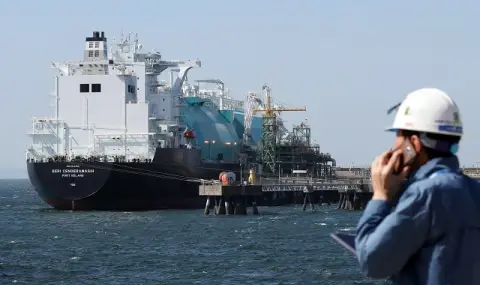Three years after the start of the war in Ukraine, Europe's energy security remains fragile, and geopolitical uncertainty surrounding the administration of President Donald Trump is causing European leaders and industrialists to reconsider the possibility of resuming imports of Russian gas, writes "Reuters".
American liquefied natural gas (LNG) partially compensates for the loss of Russian supplies after 2022, but increased dependence on the US raises concerns. Trump uses energy as bargaining chip in trade talks, urging Europe to reduce its trade surplus with the US. This raises doubts about the long-term stability of supplies.
Against this background, executives from Engie and TotalEnergies allow the return of Russian gas, including LNG from Novatek. Didier Hollot of Engie said Russia could once again cover 20-25% of the EU's needs if a "reasonable peace" is achieved in Ukraine, although this is a significant drop from 40% before the war.
TotalEnergies boss Patrick Pouille also warned of over-reliance on US LNG and estimated the possible volume of Russian imports at around 70 billion cubic metres per year - far below the pre-war 150 billion.
The French energy system is more resilient thanks to nuclear power, while Germany, which was heavily dependent on Russian gas, is under pressure. At the Leuna Chemical Park, German industrialists are pushing for a quick resumption of imports from Russia, noting that pipelines can lower prices more effectively than subsidies.
"We are in a severe crisis and we cannot wait," said Christoph Günther, managing director of InfraLeuna, the park's operator.
He said the German chemical industry had cut jobs for five consecutive quarters, something not seen in decades.
"Reopening the pipelines would lower prices more than all the current subsidy programs," he said.
"This is a taboo subject," added Günther, saying that many colleagues agree with the need to return to Russian gas.
Almost a third of Germans voted for Russia-friendly parties in federal elections in February.
Almost half of residents in the eastern state of Mecklenburg-Western Pomerania support a return to Russian gas, with 49 percent of Germans wanting a return to Russian gas supplies, a survey by the Forsa Institute found.
The industry wants the federal government to find cheap energy, said Daniel Keller, economics minister for the state of Brandenburg - home to the Schwedt refinery, co-owned by Russian oil company Rosneft but under the guardianship of the German government.
"We can imagine the resumption of the reception or transportation of Russian oil after peace is established in Ukraine," Keller said.
Meanwhile, the EU is preparing to increase LNG imports from the United States, which already provides 16.7 percent of European supplies. But experts such as Tatyana Mitrova of Columbia University warn that LNG could become a geopolitical tool. Analysts do not rule out the possibility that Washington will restrict exports in the event of domestic price spikes or trade escalation.
The EU has set a non-binding goal to end Russian imports by 2027, but there is no concrete plan yet. Meanwhile, European companies are pursuing arbitration cases against "Gazprom" for undelivered gas. Didier Hollot said that the possible payment of the awarded compensation could serve as a basis for resuming trade relations.
The courts awarded Germany's Uniper and Austria's OMV 14 billion euros and 230 million euros, respectively. Germany’s RWE is seeking 2 billion euros, while Engie and other companies have not disclosed their claims.
Engie’s Holleaux said Kiev could allow Russia to send gas through Ukraine to meet arbitration payments as a starting point for resuming contractual relations with Gazprom.
“You (Gazprom) want to return to the market? Very well, but we will not sign a new contract if you do not pay the award,” Holleaux said.
The return of Russian gas worries Maksim Timchenko, head of DTEK, the Ukrainian private gas company that hopes to import American LNG into Ukraine’s storage and export it to Europe.
“It is difficult for me to comment because I am Ukrainian, but I hope that European politicians have learned their lessons from working with Russia,” Timchenko said.
